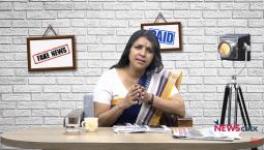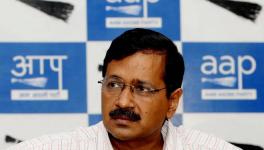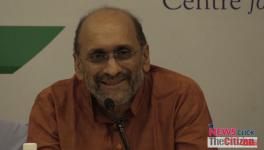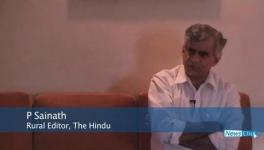Paid News: Politicians under Scanner, but what about the Media?
The Election Commission has disqualified an MLA of Uttar Pradesh from contesting elections for three years on account of ‘paid news’. But till now no media group has been punished for the same. Senior journalist Sukumar Muralidharan speaks to Newsclick about the issue.
Rough Transcript
Prabir Purkayastha (PP): Today we have with us Sukumar Muralidharan who is a Media Analyst also a well known journalist. Sukumar, the issue of media control, paid news is been in the air for quite some time. Currently, there is a broadcast regulation which has been sought to be brought also there is this report which has not come from election commission which has disqualified an MLA for paid news. So both these things are happening simultaneously. Do you think there is a chance actually that media will be regulated or regulate itself.
Sukumar Muralidharan (SM): Well, the directive of the election commission to disqualify an elected MLA of Uttar Pradesh has no bearing on media as yet. There is no hint of sanction of any sort imposed on media an obvious misconduct, the entire burden is being bone by the elected representative. No tears for that to be shed of course because it is an obvious electoral mal practice. But we have to question how media has been conducting itself over the last many years is not a newly discovered irregularity in the media functioning. People have been expressing concerns over about it in public. Press council has gone into this issue with some depth and media industry successfully managed to keep that full report out of pubic gaze at least almost for several months. It's only an action under the Right To Information Act which brought that full report into public attention. So, it is obviously a beginning. There is two more very high profile cases involving paid news which election commission is engaged with. One involves as prominent personality Chief Minister of Maharasthra, Mr. Ashok Chavan. The other is also former Chief Minister Mr. Madhu Koda of Jharkhand. So once these cases are determined, I think the public will be more alive and sensitive to the issues involved.
PP: Interesting issue really is that there is no punitive action that can be taken against erring media, print media in this particular case except perhaps violation of income tax if any. But otherwise they have declared this income as advertisement that really nothing that they can be holed up for or punitive action that can be imposed on them.
SM: it seem that they have not declared income at all because I don't think they have categorized income or circulation or advertising revenue so there is a possible case to be made in income tax act. That is in fact one of the recommendations of the sub committee of press council that there should be action under this act. Also, recommendations which newspaper industry managed to delete from the first public version of the report which is that journalist should have better job security and should be given assurance of basic wages as the wage board determines from time to time. As you know journalists have been moving increasingly to the contract system and doesn't have job security which means it's very difficult to resist pressures from other departments. Advertisement department. Advertisement department says that you carry your story under your byline written by a candidate from election. No journalist who has any regard for professional reputation would do it. When he is on two years contract, he is dependent on the whims of employer and he is completely has no assurance of job security. Well he might be under pressure to do it.
PP: One issue is the wage but the really issue is as long as there is this contract form of labour, it is very difficult for the journalist to really stand up to the management and carry paid news under the bylines as you said. So on this larger issue of paid news which is masquerading as actual news there has really been no change that is taking place in the last so many months that we have seen.
SM: Yes, in fact that has been the unfortunate trajectory that the India media has chosen since at least fifteen years or so. I think mid 90s all kind of pushing threshold the newspaper industry decided that it's main parameter on which competitive advantage would be determined would be price. It wouldn't be the quality of the content, quality of information that you provide usually which has been the price. The Times of India in that regard and unfortunately most papers compelled to follow that example. So less and less money is given to news gather and more and more syndicated mass polluted machine polluted staff. The emphasis is entirely on advertising carrying that kind of stories, the advertising and carrying that kind of stories that advertisers would appreciate rather than reading public.
PP: But nevertheless for that to paid news is actually a quality to jump.
SM: But there are continuities if you look at actual trajectory. Now if you look at the abstract you might think there are entirely different kinds of cases. But in terms of actual practices of media, there is a kind of continuity because once the price competition is unleashed, the next step was that the leading newspaper in the country the biggest media house started media net which is that they will bring in public relations firms into their news gathering enterprises because they said that journalists are limited capable of news gathering, the real issue is much wider range of interest. So the PR agency has a legitimate role to play in the news gathering. They said that we will identify each story by a label. It was done for a week after that there has been no such identification. The real issue has been in the dark about which story is paid for and which is not. That's the manner in which it started. Then there was a practice of private treaties by which newspaper acquired shares of particular companies free of cost. The payment was made in terms of advertisement space. Newspaper pumps up the company's public image. Newspaper comes up with the offering of initial public offering of shares. Newspaper en-cashes it on. So these kind of arrangements started right from the early years of this millennium and gathered momentum. If you look at that context trajectory I think paid news is that next step in that.
PP: Do you think there is any possibility of any shift or do you think that for all practical purposes, the game is up. But, this is the way it is going to continue.
SM: Print media is facing a crisis. There is no running away from that fact because 2008 was a very bad year. We all know year of the global economic downturn advertising spending on economy collapsed. At present, the spending on the economy collapsed. The print media early 2009 was in very deep distress. High power delegation in the print media went to the government in the Ministry of Finance and asked for special bail out package. Now that was extremely undignified for print media which has always spiraled it on it's independence and on integrity and it's distance from the government. This is just prior to the elections being notified. Since then advertising spending has picked up but the signs increasingly are that print media share is shrinking. More and more it's going to the electronic media.
PP: Now that's a different issue in the sense but the change from paid news back to the real news is not likely to happen because IF the contract system continues as it is doing plus this pressure of advertising revenues as you said. This part of it, the paid news and advertisement masquerading as news is not going to change. Is that the scenario?
SM: It's upto the readership to really bring that and readership is increasingly, surveys are showing that readers tend to spend much less time on newspaper than before. The volume of circulation is increasing but each reader is spending very much less time on newspaper than before. But if there is demand that it manifest for quality information then the obverse of that is readership will have to be prepared to pay for it. Ridiculously underpaid newspaper we have today will be thing of the past. We need to have realistic level of pricing to make reinvigorate newspaper as the source of information rather than entertainment or advertising.
PP: The solution of government might bring the kind of some kind of broadcasting regulations guideline etc. really do not address this issue at all. Do they?
SM: Well, the bureaucratic solution is going to prove very inadequate to the situation because we have an authoritative ruling by the Supreme Court that the airwaves are public asset to be used for public good. Unfortunately since that judgment is delivered in 1996 we have this big boom in satellite and cable broadcasting but entirely driven by the corporate sector. If you look at certain global trends Murdoch has got the same philosophy wherever he operates. But look at United States his Fox News Channel has set up much much less threshold of quality than his main broadcast enterprise in UK which is Sky B. Sky B has won year after year broadcast awards in United Kingdoms. Now what essential news is that fox news doesn't have much competition so it can dish out whatever propagandist norms it wants. In UK there is BBC which is Public Service Broadcast whatever it's false over years it had got same reputation that it had before in fact, much of it's reputation in India is unwarranted. It's kind of legacy, kind of colonial fixation. But still, it sets a standard and sky B has to measure up to that standard. So they are not able to plum the string of debts as fox news in United States. So if we had a public service broadcast that would set a kind of template and most of the broadcasters would not dare to go down below a certain threshold of quality. Unfortunately it is not coming because Doordarshan which is supposed to be a public service broadcast remains under complete bureaucratic stranglehold and completely lacks any kind of journalistic imagination.
PP: Thank you very much on this discussion.
Get the latest reports & analysis with people's perspective on Protests, movements & deep analytical videos, discussions of the current affairs in your Telegram app. Subscribe to NewsClick's Telegram channel & get Real-Time updates on stories, as they get published on our website.






















